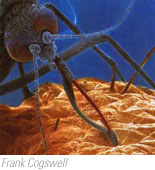 |
||||
Division of Bacteriology & Parasitology Malaria, a mosquito-borne disease, is a major global health concern. The development of safe and effective anti-malarials is a worldwide priority, especially as treatment with chloroquine, the drug of choice for malaria for over 50 years, has been compromised by the increasing prevalence of chloroquine-resistant malaria parasites worldwide. A long-standing collaboration between investigators of the Division of Bacteriology & Parasitology and the Department of Tropical Medicine and Parasitology of the Tulane School of Public Health and Tropical Medicine is devoted to developing new drugs that may be active against Plasmodium falciparum malaria strains that are resistant to chloroquine. A basic study of key features of the host response to infection with another species that causes malaria, namely, Plasmodium vivax, also is being investigated through this same collaboration. Using human DNA microarrays and peripheral-blood mononuclear cells obtained from rhesus macaques that were infected with a simile of P. vivax, the monkey parasite P. cynomolgi, divisional investigators are studying transcriptome profiles of host gene expression during infection. Division of Comparative Pathology The Division of Comparative Pathology has developed a nonhuman primate model of malaria during pregnancy. Plasmodium coatneyi is used to infect rhesus monkeys with severe malaria during pregnancy and induces clinical features and placental pathology very similar to those caused by P. falciparum in pregnant women. The goal of these studies is to determine the etiology of the poor fetal outcome (abortion, low birth weight, early infant death, etc.) that occurs when pregnancy is complicated by malaria. The aims include the role that parity (number of prior pregnancies) and prior immunity to malaria plays, as well as the direct and indirect effects of malaria on the maternal and fetal immune system. Much of this work involves investigating the combination of immune responses associated with successful pregnancy, the effective defenses against malaria, and the effect that these two diametrically opposed responses have on the placenta and placental function. This work has led to collaborative studies of human placental pathology induced by P. falciparum and P. vivax in pregnant women at the Shoklo Malaria Research Unit in Mae Sot, Thailand.
|
|
©2013 Tulane University |
